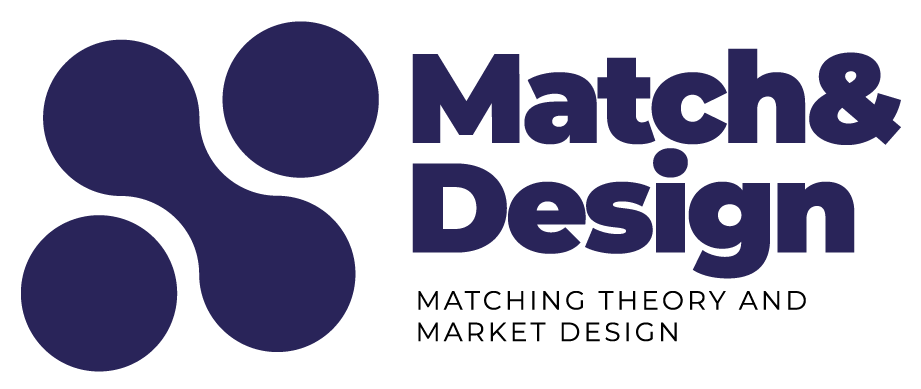Matching theory and market design are powerful tools used to solve allocation problems in various real-life scenarios. These concepts draw upon mathematical principles and economic theories to create efficient and fair systems that pair entities or individuals in a way that maximizes overall welfare and minimizes inefficiencies.
Matching theory is a branch of mathematics and economics that focuses on designing systems to allocate resources, individuals, or
objects to one another in a manner that respects preferences, priorities and constraints. It seeks to find optimal matches that lead
to the best possible outcomes for all parties involved. The theory is based on the idea of stable matchings where no individual or group
has an incentive to deviate from their current pairing or well-known efficiency and fairness concepts.
Market design is a broader concept that encompasses matching theory and extends to the creation of effective marketplaces. It aims to overcome challenges related to market failures, incomplete information, and other inefficiencies by designing mechanisms that facilitate fair and efficient exchanges. Market design can involve the creation of new market structures, rules, and algorithms to improve resource allocation.
School Choice Systems: Matching theory and market design are widely used in school choice programs, where students are allocated to schools based on their preferences and schools’ capacities. These algorithms ensure that studentsare assigned to schools in a way that maximizes their satisfaction and avoids scenarios like overcrowding or undersubscription.
Real-Life Applications
Kidney Exchange Programs: In healthcare, matching theory is employed in kidney exchange programs. Patients in need of kidney transplants often have willing donors who are incompatible due to blood type or other factors. Matching algorithms help find compatible pairs of patients and donors to facilitate multiple kidney swaps, increasing the chances of successful transplants.
Job Market Matching: Matching theory plays a crucial role in labor markets, helping to match job seekers with job opportunities. Online job platforms and algorithms use preferences and qualifications to match candidates with suitable positions, enhancing the efficiency of the job market.
Organ Transplants: Beyond kidney exchanges, matching theory is used in broader organ transplant systems.
Algorithms are employed to match organs with recipients based on factors like medical compatibility, urgency, and waiting time, optimizing the allocation of scarce resources.
Ride-Sharing and Delivery Services: Matching theory is applied in ride-sharing and food delivery platforms to efficiently connect drivers with passengers or customers. Algorithms consider factors such as proximity, demand, and driver availability to create optimal matches and reduce waiting times.
Housing Allocation: Market design is used in housing allocation systems, such as public housing or student dormitories. Algorithms help allocate housing units to individuals based on their preferences and needs while ensuring fairness and minimizing waste.
Matching theory and market design provide essential tools for solving allocation problems in diverse fields. By leveraging mathematical principles and economic insights, these concepts enable the creation of efficient systems that enhance resource allocation, improve market functioning, and ultimately contribute to better outcomes for individuals and society as a whole.
